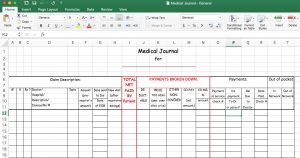Mastering your medical paperwork: Tips from a professional organizer
By Radha at Inspire
Inspire is a leading social network for health that connects patients and caregivers in a safe permission-based manner
Mastering your medical paperwork: Tips from a professional organizer
Who knew getting sick could require the combined skills of a librarian and an archivist? For most of us, managing the paperwork that comes with medical care can be an overwhelming task.
“In so many ways, you’re powerless,” said J.J. Jackson, an organization professional in the Washington D.C. area and owner of PaperworkMaven.com. “Especially people who have a lot of doctor’s appointments, they’re really sick and just don’t have the energy to do all this stuff… It’s so frustrating and it takes emotional time.”
Getting on top of medical paperwork – mainly, knowing where things are, what is complete, and what is not – can help people reclaim some power.
“It definitely empowers me,” Jackson said, because tracking her information gives her a complete picture of her medical and financial situation and she can speak with confidence about tests, needs, and money paid and owed.
Organized medical paperwork can also reduce stress and even save money. If you’re struggling to keep medical paperwork organized, here are 5 easy tips from a professional organizer.1. Put everything in one place
1. Put everything in one place
At minimum, having everything together is critical, Jackson said. This could be the point where some people stop; it might be a starting point for others to organize further. But as long as everything is in one spot – a box, a folder, a digital file – you can get to it later.
2. Set aside time for paperwork (it’s probably less than you think)
Time is the number one thing that Jackson said gets in her way.
For someone who has regular medical appointments and a paperwork backlog of several months, Jackson estimated about three hours of concentrated work to organize paperwork into a system. However, once the system is in place, it may require less than 30 minutes per week to log and file new information. In her experience, Jackson said calling insurance companies takes up the most time.
3. A Table of Contents is your best friend
Ideally, a system for paperwork would have an easy-to-skim main document to which related materials like receipts, Explanation of Benefits statements, medical reports, and images can be traced. This also makes it easy for others to figure out your medical picture, if necessary. It can be physical or digital.
Through her personal and professional experience, Jackson created a simple spreadsheet to track claims, a few claim details, and payments. Each line item corresponds to one day. Jackson labels related documents with the same line-item, so she knows what claim they correspond to. She won’t check off a line item until each task and payment associated with it is resolved.
“It’s about making sure you have enough detail to track things needing attention and things that are done,” she said,

Create a chart to organize and track your medical paperwork.
4. Delegate
Many people don’t realize they can and should delegate paperwork-related tasks. But, Jackson said, consider that having your medical paperwork in order is important enough to devote resources to it.
“I think people think they ought to be able to do it themselves,” she said. “It’s ok if you don’t want to do it. If someone is sick, I think it would be such a gift to them. If they just don’t have time or energy or the emotional capability doing that, as a family member or friend, that is an excellent gift to give.”
Expert resources from organizations like the National Association of Productivity and Organizing Professionals and the American Association of Daily Money Managers could be of use said Jackson, who enlists help for medical tasks herself. And depending how comfortable you are letting others see sensitive personal health information, hiring someone to sort, log, file, and do general paperwork-related tasks could also help.
5. Physical vs digital systems
Digital organization and cloud storage will be the way of the future, Jackson said. The challenge right now is that medical information is spread over multiple locations and multiple types (paper receipts and reports, emails, digital image files, audio recordings, and personal notes, to name a few) and there aren’t good ways to integrate these in one system.
Jackson has separate locations for physical and digital materials but sticks to the same labeling system that corresponds to her main chart. If you’re really committed to a paperless system, a good scanner is essential, Jackson said. A robust organization system should accommodate how you like to store and track your materials and adapt to changes in health needs over time.
Except for those who enjoy detailed organization work, Jackson admits getting medical paperwork organized is not fun. Rather, it’s a means to an end.
“The feeling I get when I’m done is really satisfying,” she said. “I feel accomplished and I feel empowered and like I have peace of mind.”
